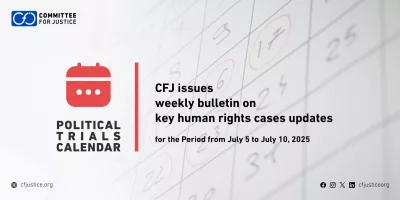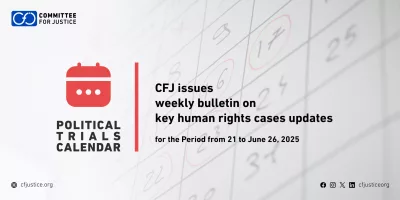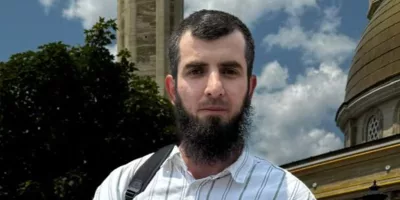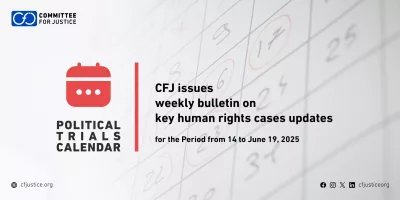The Committee for Justice said today that as part of its Justice Watch project, it has examined the files of case No. 9115 of 2020, South Giza, known in the media as the “Helwan Microbus Case”, and prepared a report on the most prominent violations that occurred against the defendants.
At the beginning of its report, the organization’s team indicated that during the period from 2015 to 4/10/2016, several crimes occurred in the governorates of Cairo and Giza, according to what was written by the official version and the indictment, and a number of independent records were issued for each incident. On 6/5/ 2016, a report of investigations was issued with the knowledge of the National Security, and attributed the incidents to a group of people which it said were affiliated with “the ideas of the terrorist ISIS group”. In light of those investigations, the Supreme State Security Prosecution ordered the seizure and arrest of the 32 suspects whose names were listed in the National Security investigations, 26 of them were arrested. The prosecution ordered their detention pending investigations and charged them with “joining a group founded in violation of the provisions of the law, providing the group with material and financial aid, murder, attempted murder, sabotage of public and private property, theft, theft of weapons and ammunition, manufacture and use of explosives, possession of firearms and ammunition.”
The Supreme State Security Prosecution adopted the viewpoint of the investigation conductor and what was written in his report. On 16/11/2016, it ordered the referral of the 32 defendants (26 of them in presence and 6 in absentia) in Case No. 9115 of 2016 South Giza District to the competent criminal court, which issued rulings against them by the North Cairo Criminal Court, Circuit 23, on 25/11/2019. The verdicts included punishing 7 of the defendants with the death penalty and obliging them to pay the value of the things they destroyed, while 3 of the defendants were sentenced to fifteen years in prison, 11 of them to ten years, and seven were acquitted.
The defendants did not accept the verdicts. Therefore, they decided to appeal in front of the Court of Cassation. On 4/13/2021, the Court of Cassation upheld the criminal verdict that sentenced 4 defendants in attendance to death by hanging. One case of death penalty was cancelled because the appellant died in prison.The court also sentenced 14 others to rigorous imprisonment.
The verdicts are now final and cannot be appealed. As for those who were convicted in absentia, some of them are currently being retried before the criminal court after they were arrested.
Below we review what happened in the investigations and trial, to analyze the violations of the right to a fair trial that occurred with the victims:
1- Anonymous, unsubstantiated investigations:
The investigations conducted by Major Mustafa Mahmoud, an officer in the National Security Sector, relied on secret sources that he refused to disclose during the investigations, allegedly out of concern for their life. This is what he said in the investigations of the Public Prosecution office on 3/9/2016. Therefore, the Justice Watch team at the Committee for Justice saw that the investigations are described as anonymous and unsubstantiated.
2- Enforced disappearance:
The analysis found that 19 out of 28 defendants were unlawfully detained for periods ranging from 8 to 97 days. They were detained between police stations and National Security headquarters; their news was withheld from their families; and they were prevented from communicating with the outside world. They were arrested on dates contrary to the actual arrest facts, and the Supreme State Security Prosecution did not investigate this.
3- Investigation in the absence of lawyers:
The Public Prosecution Office began interrogating 21 of the defendants in the absence of their defence. According to the investigations, the Public Prosecution sent a representative to the Bar Association, but it was closed. Upon review by the justice monitoring team, it became clear that there is no element of necessity and urgency to conduct the investigation in the absence of a lawyer, so the investigation with the accused in the absence of a lawyer is an invalid procedure.
4- Torture:
19 defendants in the case were subjected to torture, including beatings, electric shocks, holding fists for long periods of time, and threats to arrest and torture members of their families in front of them if the charges were denied by the prosecution.
5- Recycled cases and renewed detention:
The Justice Watch team has learned that the defendant, Omar Ramadan Omar Ahmed, confirmed in the investigations of the prosecution on 10/8/2016 that he had been imprisoned pending another case for two years before he was referred to that case. Likewise, the defendant Ramadan Omar Ahmed Salem proved in the prosecution’s investigations on August 13, 2016, that he has been imprisoned for 3 years pending another case.
It is noteworthy that the file of this case, and other issues can be accessed through the membership of the CFJ sharing platform, which can be subscribed to through this link …
For more information about the platform and its services, please contact:
Executive Director of CFJ Ahmed Mefreh, via this email: amefreh@cfjustice.org
Or CFJ’s Advocacy Officer Shaima Abu al-Khair, via this email: saboelkhir@cfjustice.






